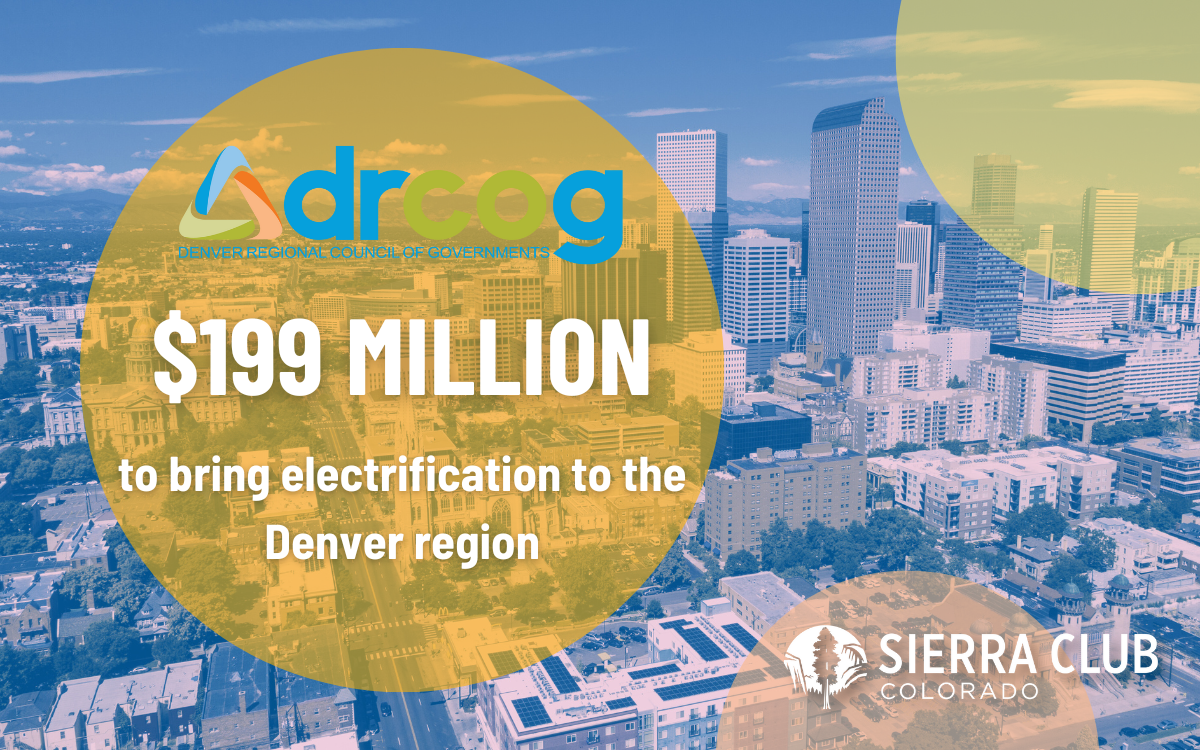The Denver region and the state of Colorado received electrifying news Monday from the Environmental Protection Agency. After submitting applications for the Climate Pollution Reduction Grant Program in April, the Denver Regional Council of Governments was announced today as a recipient of $199 million for building electrification and energy efficiency work.
This is massive news for climate action and environmental justice in the state. But what does this mean for you, me, and our communities? Let’s dive into how this funding will be utilized and the transformative impact it will have on our region.
Decarbonize DRCOG: A Zero-Emission Building Initiative
DRCOG represents approximately 3.3 million people or about 56% of the total state population. Within the region, buildings represent almost half of the total greenhouse gas emissions produced. Fossil fuel-reliant buildings not only exacerbate the climate crisis but also harm public health, disproportionately affecting low-income and disadvantaged communities.
With all of this in mind, DRCOG developed its Zero-Emission Building Initiative to achieve region-wide net zero emissions by 2050 with an emphasis on low-income and disadvantaged communities. To do this, they outlined four key measures:
- Measure 1: Provide full-service decarbonization, including free home retrofits and upgrade services, to low-income and disadvantaged communities
- Measure 2: Offer free energy advising to home and building owners, including information on financing and rebates
- Measure 3: Provide incentives and funding for energy efficiency, electrification, and on-site renewable energy
- Measure 4: Adopt building energy codes and performance standards that exceed state requirements
As the region faces escalating climate impacts, Decarbonize DRCOG will serve as a strategic, impactful, scalable, and replicable approach that will mitigate future climate impacts, build community resilience, and foster a brighter future for Colorado and the Mountain West.
- Decarbonize DRCOG: A Zero-Emission Building Initiative
Taken as a whole, these measures have the potential to cumulatively reduce greenhouse gas emissions by up to 148,176,499 metric tons by 2050. But the impacts of this funding go beyond just greenhouse gas reductions.
Workforce Development
In order to get to net zero emissions by 2050, Colorado and the front range need a workforce that is trained to install heat pump technology and provide electrification and energy efficiency services. Threaded throughout this plan are strategic workforce initiatives aimed at recruiting, training, and deploying a workforce ready to tackle the electrification transition.
With an eye towards equity, among the initiatives are programs that will support the recruitment, preparation, and employment success of prospective low-income, youth, and previously incarcerated workforce entrants. DRCOG will also implement an Innovation Pilot Program aimed at supporting entrepreneurial businesses and technologies that will accelerate the electrification transition.
Community Engagement
Opportunities for community engagement are abundant throughout the Decarbonize DRCOG plan. Individuals can participate in workshops, surveys, and submit public comments for the program. Direct collaboration with local leadership and community organizations will be crucial for effective outreach, especially in low-income and disadvantaged communities. DRCOG also plans to develop advising resources in multiple languages including Spanish, Vietnamese, and Arabic.
As part of the program, full-time staff focused on energy advising will be available to guide residents through the sometimes complicated process of building decarbonization. The advising program will offer tailored services to residents and building owners and prioritize work in low-income and disadvantaged communities by providing double the consultation hours available to them versus other properties.
Climate Justice
According to a report by the American Council for an Energy-Efficient Economy, American households can save $96 billion through reduced energy costs from electrification, but only if lower-income households electrify alongside higher-income ones. Throughout the program, low-income and disadvantaged communities are prioritized for workforce development and job opportunities, weatherization services, education and engagement options, and full electrification services. Almost 50% of Colorado’s identified disadvantaged communities are within DRCOG and as our state moves toward an all-electric future, providing the much-needed funding and support to these communities will be crucial.
Funding is Here Thanks to the Inflation Reduction Act
"The Inflation Reduction Act continues to deliver for the American people, and these transformational awards will expand access to clean air and clean water, and move us closer to meeting the mark in the fight to stave off the very worst of the climate crisis."
- Ben Jealous, Executive Director of the Sierra Club
The $199 million in funding awarded to DRCOG wouldn’t be available without the Inflation Reduction Act. To date, Colorado has already received hundreds of millions of dollars from the IRA and more investments are on the way. Adding the potential thousands available to individuals through tax credits and rebates, and the IRA is significantly helping Colorado transition to a clean energy future.
